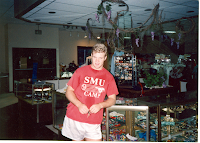He was one of the greatest sports columnists of our time, Jim Murray was.
 The top honor in sports journalism, however, is named the Red Smith Award, presented annually by the Associated Press Sports Editors organization. Walter "Red" Smith was its first winner, in 1981.
The top honor in sports journalism, however, is named the Red Smith Award, presented annually by the Associated Press Sports Editors organization. Walter "Red" Smith was its first winner, in 1981.Jim Murray was the second winner, in 1982. They could have reversed the order and called it the Jim Murray Award, and I suppose not many people would've objected.
But where Red Smith -- opinionated as he was -- was known for his prose and his brilliant command of the language, and he was regarded as a class act in every way, Murray was known for his razor-sharp wit and his often unkind commentary.
Murray was, from all accounts I've read, a humble guy without much ego. He had a lot of people fooled the way he wrote. He came off as ... an opinionated jerk. Red Smith didn't.
We were fortunate for about a decade (mid-1960s to mid-'70s) to see their work regularly in The Shreveport Times when their columns were syndicated by The New York Times (Smith) and Los Angeles Times (Murray). It was brilliant writing, of course, and it was a nice balance to the local copy.
I was always more of a Red Smith guy, loved his take on things. Murray, to me, was a novelty act -- a series of one-liners. As great (and wacky) as my sense of humor is, I just never was much for a column full of that. But lots of people thought Murray's work was hilarious.
And he was great. His columns on his blindness and on the death of his first wife were classics, as moving as anything I've read.
Anyway, this discussion is about sports columnists -- a more narrow focus than my piece earlier this week on sportswriting in general these days.
I've known a lot of "opinionated jerks" and I've worked with some. But many sports columnists are fine people, genteel even, and they could be critical, yet not leave people with hurt feelings.
Some really can be jerks, intentionally slamming people, and I don't like dealing with them (nor them with me). Still, they are effective columnists. People read their stuff and talk about it -- and that's what a newspaper wants from a columnist.
Opinionated columnists can carry a sports section; they can help sell newspapers, they provide that "edgy" factor we talked about earlier this week. No question. That's why some make big bucks, bigger than sports editors. No problem with that.
What I've found over the years is that these people often had large egos and were terribly self-involved. They had "I" problems; they couldn't see the world outside of their own viewpoint. No opinion counted, except their own. They were absolutely convinced they were correct.
(Having been called "condescending" repeatedly this week by a co-worker, I can identify. Obviously, I may fit into the "opinionated jerk" category at times. I'm sure I've left that feeling dozens of times over the years, and sometimes I'm guilty. Bedside manner, dealing with what I perceive as mediocrity, is not a strong suit.)
Being a columnist, sports or otherwise, requires dealing well with criticism. I didn't have thick enough skin or enough writing confidence to be a fulltime columnist. I do admire people who have that.
I'm also grateful to those columnists who, when a copy editor (such as me) points out something that might not be factual or expressed correctly, are appreciative of input. That is often the case ... but not always.
Some resent any input, any correction. And their final fallback position is this, "It's my column; it's my voice; that's how I want it to read."
Here's an example. In the first of my 10 years at the Fort Worth Star-Telegram, a columnist writing about the Dallas Cowboys quoted coach Dave Campo on something he screamed at the officials during a game. What he had Campo saying wasn't correct; I know it wasn't correct because I saw the moment first-hand. When I called the writer to voice that, he didn't want to hear it. He insisted Campo had screamed what he had written.
I left it the way he had it. I knew it wasn't correct. I also knew I couldn't trust what the guy was writing; it wasn't the first questionable thing I had seen by him.
He was being an opinionated jerk. In this case, he twisted reality for what he needed to make his case.
He wasn't at the paper much longer.
So there's a lot of opinion and there are a lot of jerks in this business. There are not a lot of Red Smith Award or Jim Murray Award winners. But we -- writers and editors -- should all strive to do the work we do with integrity, don't throw a bunch of crap out there. That's just bottom-line important.








